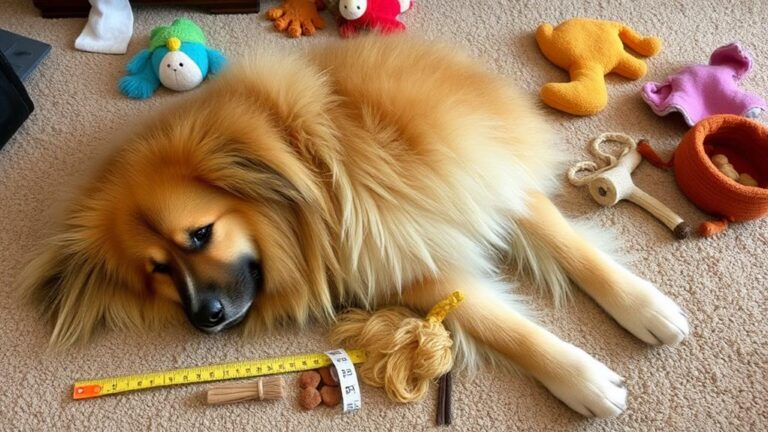If your dog ate ham, first monitor him for any signs of vomiting or distress. Ham has high fat and salt, which can upset his stomach. Don't give him cooked ham bones, as they can splinter and cause serious injuries. Instead, offer lean meats like chicken or turkey in small amounts. Simple veggies like carrots or green beans make great snacks too. Always provide fresh water. If your dog shows any unusual behavior within 24 hours, contact a veterinarian. Keeping an eye on your dog's health is essential for his safety and well-being, and there's more to know about managing his diet.
Immediate Actions to Take
If your dog just gobbled down some ham, it's important to act quickly. First, watch your dog for any signs of vomiting or distress. If he starts throwing up, contact your vet right away.
Additionally, you should be aware that certain foods, like onions, can be toxic to dogs, adding to the importance of monitoring his diet closely onion toxicity risks.
It's also a good idea to avoid giving ham to your dog in the future. Be careful with ham bones, too. Never give your dog cooked ham bones, as they can splinter and cause serious injuries. Splinters can lead to choking or damage to the intestines.
Always keep an eye on how your dog's feeling after eating ham. Monitoring him guarantees you notice any problems early.
Nutritional Risks of Ham
Ham, while not toxic to dogs, poses several nutritional risks that pet owners should be aware of. It's high in fat and sodium, which can be harmful. Eating too much ham can lead to health issues for your dog. Some dogs may even get upset stomachs or gain weight.
Here's a quick look at the risks:
| Nutritional Element | Risk Description |
|---|---|
| Fat Content | Can cause obesity and pancreatitis. |
| Sodium | May lead to dehydration or kidney issues. |
| Preservatives | Some may cause allergic reactions. |
| Low Nutritional Value | Doesn't provide essential nutrients. |
Always remember, ham can be a rare treat but is not a healthy food choice for your furry friend.
Understanding Food Toxicity
Many pet owners underestimate the potential toxicity of certain human foods for their dogs.
It's important to know that some foods aren't just bad—they can be harmful. For example, ham isn't poisonous, but it can be high in fat and salt. Eating too much can upset your dog's stomach and lead to other serious problems.
Additionally, just like risks with chicken bones, it's essential to monitor your dog for any signs of distress after consuming any unusual foods. You should also be careful with ingredients in foods. Some items, like raisins or xylitol (a sweetener), are very dangerous for dogs.
Always check what you give your pet. Understanding food toxicity helps keep your furry friend safe. Pay attention to your dog's reactions if they eat something unusual, and don't hesitate to contact your vet for advice.
Safe Alternatives for Dogs
Considering safe alternatives for your dog after they've eaten ham is essential for their health. Instead of ham, give your dog small amounts of lean meats like chicken or turkey. Cook them without spices, and make sure there are no bones.
You can also offer simple vegetables like carrots or green beans. These are low in calories and healthy for dogs. If your dog is still hungry, try dog food or treats specifically made for them.
Always have fresh water available, too. It's best to consult your vet, especially if your dog shows any unusual signs. They can help you figure out the right foods for your dog's needs and keep them healthy as they recover.
Risks of Ham Bones
Cooked ham bones pose significant risks to your dog's health and well-being. These bones can splinter and create serious problems.
Here are three main dangers:
- Choking Hazards: Splintered pieces can get stuck in your dog's throat, blocking their airway.
- Internal Injuries: Sharp bone fragments can tear through the digestive tract, causing pain and bleeding.
- Intestinal Obstruction: Large pieces can block the intestines, leading to life-threatening issues.
Because of these risks, it's best to avoid giving your dog ham bones altogether. They might seem like a tasty treat, but the dangers far outweigh any fun they provide.
Always choose safe options to keep your furry friend happy and healthy!
Monitoring Your Dog's Health
Monitoring your dog's health after eating ham is essential to guarantee their well-being. Keep an eye on any changes in their behavior. If they start vomiting, whining, or acting restless, contact your vet immediately. These could be signs of distress.
Check for any signs of diarrhea or stomach upset, which are common after eating rich foods like ham. Remember that your dog might also become more thirsty due to the high salt content in ham. Offer plenty of fresh water and see if they drink normally.
If your dog shows no signs of trouble in the first 24 hours, they're likely okay, but continue to watch them closely for any late reactions. Always consult your vet if you're uncertain.
Conclusion
If your dog eats ham, stay calm and monitor them closely. Even though ham isn't toxic, it can upset their tummy or cause other issues. Remember to avoid giving them ham bones, as these can break and hurt them. Instead, choose safe treats like carrots or plain chicken. Keep an eye on how your dog feels after eating ham. By being careful, you can help keep your furry friend healthy and happy!



